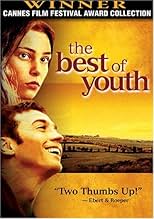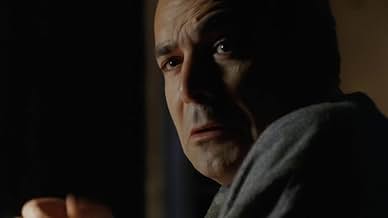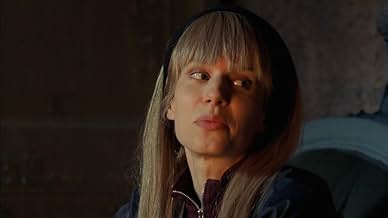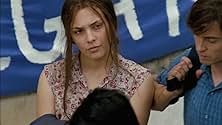NOTE IMDb
8,5/10
25 k
MA NOTE
Épopée italienne qui suit la vie de deux frères des années 60 à l'an 2000.Épopée italienne qui suit la vie de deux frères des années 60 à l'an 2000.Épopée italienne qui suit la vie de deux frères des années 60 à l'an 2000.
- Réalisation
- Scénario
- Casting principal
- Récompenses
- 33 victoires et 25 nominations au total
Avis à la une
It's hard not to feel like an "easy" grader to give this film a 10, given that it is the very simple story of a family over 4 decades, no quirky writing or the eccentricities of "indie" films - just beautiful scenery, characters that move us and that we care about, and a sweet and believable story. The acting is excellent.
To say this is a miniseries is misleading and adds the impression of a "cheese" factor that is not present. There is a reason that this film has been taken from the small screen and released in theaters - I didn't even know it had been a miniseries until I read some of the comments here.
The story is simple but it is not trite; we may not have a huge number of surprises and no amazing plot twists and contortions but it is an emotional, moving, satisfying story.
The most moving part of the story is the love and connectedness between the characters, and how this is expressed - here in the U.S. physical display of platonic affection is virtually non-existent, unless you count athletes hitting each other on the rear. You can tell these characters really care for each other.
I sat for the second three hours today with people who sat through the first three hours with me yesterday. Some yesterday just got back in line for part 2. There was a line waiting to get in today - all people who had seen part 1 already.
Saying this movie is like Zelig as someone here did is false and insulting. We couldn't tell a story about a U.S. family that spans the 60's to the present without mentioning Viet Nam or Watergate or 9/11, so this story of course mentions events internal to Italy during that time. The historical events are a backdrop to the story, not the story itself.
The story is about this family, and we care about what happens to them. We become engaged, we sit and watch and laugh and cry with them. That's what movies are supposed to do.
To say this is a miniseries is misleading and adds the impression of a "cheese" factor that is not present. There is a reason that this film has been taken from the small screen and released in theaters - I didn't even know it had been a miniseries until I read some of the comments here.
The story is simple but it is not trite; we may not have a huge number of surprises and no amazing plot twists and contortions but it is an emotional, moving, satisfying story.
The most moving part of the story is the love and connectedness between the characters, and how this is expressed - here in the U.S. physical display of platonic affection is virtually non-existent, unless you count athletes hitting each other on the rear. You can tell these characters really care for each other.
I sat for the second three hours today with people who sat through the first three hours with me yesterday. Some yesterday just got back in line for part 2. There was a line waiting to get in today - all people who had seen part 1 already.
Saying this movie is like Zelig as someone here did is false and insulting. We couldn't tell a story about a U.S. family that spans the 60's to the present without mentioning Viet Nam or Watergate or 9/11, so this story of course mentions events internal to Italy during that time. The historical events are a backdrop to the story, not the story itself.
The story is about this family, and we care about what happens to them. We become engaged, we sit and watch and laugh and cry with them. That's what movies are supposed to do.
10Peegee-3
Can art transform life? If so, I would elect "The Best of Youth" as a primary candidate for that possibility.
Almost never in my over 60 years of film viewing have I been as deeply affected, haunted by characterizations, poetic dialog and brilliantly unexpected turns...and breadth of scope. The nuances of relationship between people...in this case the Italian family Carati, their lovers, friends, wards...are so moving, so deeply portrayed and inhabited by the actors that I was not only moved to tears, but inspired. Here is a view of how human beings can live the humanity so desperately needed in this crazed and warring world...also presented as an integral part of plot and interaction...and this done without any sort of didactic or polemic foisting...All achieved through the intimate and profound struggles of the film's characters.
Imagination and the incredible sensibility of director (Marco Tullio Giordana),writers (Petraglia and Rulli) and actors (most outstanding: Luigi LoCacio, Alessio Boni, Adriana Asti and Jasmine Trinca) combine to offer a film that carried this participant (for that's what I felt) into a realm only experienced by exceptional literature.
As is obvious...I highly recommend seeing this movie.
Almost never in my over 60 years of film viewing have I been as deeply affected, haunted by characterizations, poetic dialog and brilliantly unexpected turns...and breadth of scope. The nuances of relationship between people...in this case the Italian family Carati, their lovers, friends, wards...are so moving, so deeply portrayed and inhabited by the actors that I was not only moved to tears, but inspired. Here is a view of how human beings can live the humanity so desperately needed in this crazed and warring world...also presented as an integral part of plot and interaction...and this done without any sort of didactic or polemic foisting...All achieved through the intimate and profound struggles of the film's characters.
Imagination and the incredible sensibility of director (Marco Tullio Giordana),writers (Petraglia and Rulli) and actors (most outstanding: Luigi LoCacio, Alessio Boni, Adriana Asti and Jasmine Trinca) combine to offer a film that carried this participant (for that's what I felt) into a realm only experienced by exceptional literature.
As is obvious...I highly recommend seeing this movie.
"There is, nevertheless, a certain respect and a general duty of humanity that ties us, not only to beasts that have life and sense, but even to trees and plants." Montaigne
Rarely does a new film find a place on a longstanding short list of best ever. The Italian import Best of Youth recently entered my all time best ten, a singular honor considering I had to sit still for six hours of viewing, and I rarely sit still anytime, even if my name is DeSando and it's a family saga.
Director Francis Ford Coppola created a movie empire with his Godfather series and ended up with what some consider the best American movie ever made. It is unforgettable for its emphasis on family values mafia style and its stunning photography. The Best of Youth is decidedly not mafia related; rather it is a romantic and historical rendering of Italy from the 1960's as seen through the lives of the Carati family and their friends and lovers. The two brothers, Nicola and Matteo, represent the Janus-like conflict of liberal and conservative in the volatile last half-century of Italian social and cultural change.
This is humanistic history at its best as director Marco Tullio Giordana takes us through the sexy seventies, a devastating Florence flood, the emergence of Red Brigades, assassinations and business downturns including the Fiat layoffs. Despite deaths, suicide, and disappointment, the last line of the film, spoken in the new century, repeats the sentiment of the youthful days in the last century that everything is truly beautiful. How can you miss that theme when the cinematography emphasizes the antique charm of Italy and the close up beauty of actors who look their parts, albeit rarely ugly? The film, often tightly framed, accentuates character over plot and a certain imprisonment in character and destiny. The choice of actors is nothing short of inspired.
The genius of Best of Youth is that like Italy itself, this family is a stew of ideologies that offers up dignity of the individual as the highest value and respect (remember The Godfather) for humanity the only arbiter of peace. This film stands with Brokeback Mountain and The New World as a towering achievement and testimony to the transcending power of art to make us look at ourselves as vulnerable and beautiful.
Rarely does a new film find a place on a longstanding short list of best ever. The Italian import Best of Youth recently entered my all time best ten, a singular honor considering I had to sit still for six hours of viewing, and I rarely sit still anytime, even if my name is DeSando and it's a family saga.
Director Francis Ford Coppola created a movie empire with his Godfather series and ended up with what some consider the best American movie ever made. It is unforgettable for its emphasis on family values mafia style and its stunning photography. The Best of Youth is decidedly not mafia related; rather it is a romantic and historical rendering of Italy from the 1960's as seen through the lives of the Carati family and their friends and lovers. The two brothers, Nicola and Matteo, represent the Janus-like conflict of liberal and conservative in the volatile last half-century of Italian social and cultural change.
This is humanistic history at its best as director Marco Tullio Giordana takes us through the sexy seventies, a devastating Florence flood, the emergence of Red Brigades, assassinations and business downturns including the Fiat layoffs. Despite deaths, suicide, and disappointment, the last line of the film, spoken in the new century, repeats the sentiment of the youthful days in the last century that everything is truly beautiful. How can you miss that theme when the cinematography emphasizes the antique charm of Italy and the close up beauty of actors who look their parts, albeit rarely ugly? The film, often tightly framed, accentuates character over plot and a certain imprisonment in character and destiny. The choice of actors is nothing short of inspired.
The genius of Best of Youth is that like Italy itself, this family is a stew of ideologies that offers up dignity of the individual as the highest value and respect (remember The Godfather) for humanity the only arbiter of peace. This film stands with Brokeback Mountain and The New World as a towering achievement and testimony to the transcending power of art to make us look at ourselves as vulnerable and beautiful.
This is a great movie! I thought that all of the acting by every single actor in the movie was just bloody fantastic. I thought that every one of the characters in the movie was very believable and all of them brought me to certain emotions, it was just a great story told in a great way and again what sold it all to me was the great acting by everyone involved from the stars on down to just the supporting bit players who make this movie work. Great big kudos to the director for getting such wonderful performances out of all of these people, I would definitely recommend seeing it to any fan of movies and/or fans of great acting.
10nturner
No, the number of minutes is no typo. This film is over six and a half hours long. But as Roger Ebert says, "I dropped outside of time and was carried along by the narrative flow; when the film was over, I had no particular desire to leave the theater, and would happily have stayed another three hours." Of course, I was watching in the comfort of my home but I agree completely with Mr. Ebert.
The narrative covers the years 1966 through 2003 and focuses primarily upon the older brother of a middle class Italian family. As it begins, the two brothers of the family are ready to pursue college education as an avenue to successful careers. The younger of them is volunteering at a local mental facility as a walker - a companion for patients who need to explore the world outside the institution. He finds that the girl he accompanies is being mistreated and more or less kidnaps her in an attempt to return her to her father's home. In this effort he seeks the help of his brother and the two embark upon an idealistic quest to return the girl to the love and safety of her home. The unhappy result of their venture changes the outlooks of both and sets them on paths which diverge from their original plans. Each chooses a new course which is in conflict with his basic personality. The older brother, who had been practical in all of his previous projects, finds himself diving into an alternative culture, whereas the younger, who had been more footloose, joins the military and eventually becomes a policeman. The encounters of both during the almost forty year span of the film gives us many insightful "what ifs" of two lives and reminds us of the enormous effect sheer chance has upon each of us.
If you are familiar with the Italian political climate and events during the era of this film, your enjoyment will be heightened , but even someone as politically innocent as I had no trouble understanding the conflicts of the major characters that come from diverging ideologies. (I can probably be pretty much assured that if you are a HSC "regular" you are well versed in the politics of Italy in the latter part of the Twentieth Century.) This film has a great "feel" to it in that it doesn't fall into the trap of being overly melodramatic, which is often the bent of films that span long periods of time. I was left with a good feeling at the end but it arose from having viewed the triumphs and tragedies of a very believable family, a family whose members change and grow as a result of their experience of life just as happens in all families no matter their geographic location.
As for geographic location, the viewer of this film is treated to many memorable scenes of Italy from the grit of the city to the blissful pleasures of the islands. The experience is one of a resident of the country rather than a tourist who only has privy to a gossamer view.
If you enjoy excellent film-making and a good story, I have no doubt that you will also be "carried along by the narrative flow" just as Mr. Ebert and I can guarantee you that you will enjoy the ride.
The narrative covers the years 1966 through 2003 and focuses primarily upon the older brother of a middle class Italian family. As it begins, the two brothers of the family are ready to pursue college education as an avenue to successful careers. The younger of them is volunteering at a local mental facility as a walker - a companion for patients who need to explore the world outside the institution. He finds that the girl he accompanies is being mistreated and more or less kidnaps her in an attempt to return her to her father's home. In this effort he seeks the help of his brother and the two embark upon an idealistic quest to return the girl to the love and safety of her home. The unhappy result of their venture changes the outlooks of both and sets them on paths which diverge from their original plans. Each chooses a new course which is in conflict with his basic personality. The older brother, who had been practical in all of his previous projects, finds himself diving into an alternative culture, whereas the younger, who had been more footloose, joins the military and eventually becomes a policeman. The encounters of both during the almost forty year span of the film gives us many insightful "what ifs" of two lives and reminds us of the enormous effect sheer chance has upon each of us.
If you are familiar with the Italian political climate and events during the era of this film, your enjoyment will be heightened , but even someone as politically innocent as I had no trouble understanding the conflicts of the major characters that come from diverging ideologies. (I can probably be pretty much assured that if you are a HSC "regular" you are well versed in the politics of Italy in the latter part of the Twentieth Century.) This film has a great "feel" to it in that it doesn't fall into the trap of being overly melodramatic, which is often the bent of films that span long periods of time. I was left with a good feeling at the end but it arose from having viewed the triumphs and tragedies of a very believable family, a family whose members change and grow as a result of their experience of life just as happens in all families no matter their geographic location.
As for geographic location, the viewer of this film is treated to many memorable scenes of Italy from the grit of the city to the blissful pleasures of the islands. The experience is one of a resident of the country rather than a tourist who only has privy to a gossamer view.
If you enjoy excellent film-making and a good story, I have no doubt that you will also be "carried along by the narrative flow" just as Mr. Ebert and I can guarantee you that you will enjoy the ride.
Le saviez-vous
- AnecdotesOriginally developed as a miniseries for television. It was then released in cinemas in June 2003 as two three-hour films after the uncut six-hour version had been screened to great acclaim at the Cannes Film Festival. It was eventually aired on Italian TV as originally intended, in 4 parts, in November 2003.
- Gaffes(at around 27 mins) After a caption has shown that the film is set in 1966 at the beginning and the main characters are getting into a car, a radio is heard playing the song "Might just take your life" by Deep Purple. This song was released in 1974.
- Citations
Sara Carati, adult: What should I do?
Nicola Carati: I don't know, it depends on how strong you feel... Are you happy now?
Sara Carati, adult: Of course I am!
Nicola Carati: Then, it's time to be generous
- ConnexionsEdited into Colpiti al cuore (2019)
Meilleurs choix
Connectez-vous pour évaluer et suivre la liste de favoris afin de recevoir des recommandations personnalisées
- How long is The Best of Youth?Alimenté par Alexa
Détails
- Date de sortie
- Pays d’origine
- Sites officiels
- Langues
- Aussi connu sous le nom de
- The Best of Youth
- Lieux de tournage
- Sociétés de production
- Voir plus de crédits d'entreprise sur IMDbPro
Box-office
- Montant brut aux États-Unis et au Canada
- 274 024 $US
- Week-end de sortie aux États-Unis et au Canada
- 7 490 $US
- 6 mars 2005
- Montant brut mondial
- 2 799 773 $US
- Durée6 heures 14 minutes
- Couleur
- Mixage
- Rapport de forme
- 1.85 : 1
Contribuer à cette page
Suggérer une modification ou ajouter du contenu manquant

Lacune principale
By what name was Nos meilleures années (2003) officially released in India in English?
Répondre































